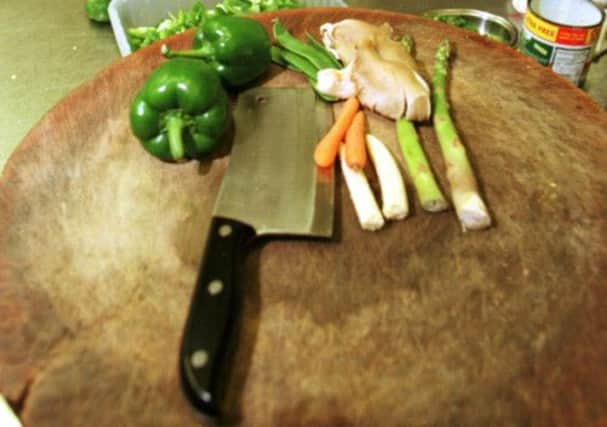Lori Anderson: Cook your way towards a healthy life


Tinned peaches with Carnation milk, Smash and wee beans and sausages, Smash with Dairylea cheese triangles, Shippam’s paste sarnies, wriggly cheese that wormed its way out of a tube, butterscotch Angel Delight, lurid Pink Panther bars – these were my staples, and I became vegetarian at the age of eight just to avoid the gelatinous, veined, cartilage-rich slop which masqueraded as the Sunday “roast” at The Andersons. When I met my school friend’s mum for the first time, she was surprised that I even had hair and nails.
But mum wasn’t a complete disaster in the kitchen. When, one day, I went home begging her to make something for the school home baking sale and told her that “all of the other mums were doing so” she did not let me down, I walked proudly to school with an array of artfully iced Snowmen biscuits. They were magnificent, and my mum had shown that when I really needed her, she would be there for me.
Advertisement
Hide AdAdvertisement
Hide AdSix months later whilst snooping for my Christmas presents, I found 70 “Newlands Bakery Iced Snowman” cellophane wrappers under my parent’s bed. I was devastated. I imagined my teachers laughing behind my back and instantly took to my bed for three days with a dose of psychosomatic flu. I never spoke of what I had found.
Now Mum is 90 and it’s my turn to take care of her nutrition; still, that says a lot for nine decades of pan loaves and butter.
I’m not the religious type but if I had to pick a place to worship it would be Whole Foods Market in Giffnock. Ever since I first wandered into their Los Angeles branches, in 1993, I felt “the change”. Here was a place to become a better me, I could have a new life where I could eat meat and cheese in their original form. Their store in Venice, LA remains number one on my list of places to be taken for a romantic dinner.
Without a Beatrice to call my own, it took me until my late 30s to finally find the kitchen. Nigella, that latter day Siren, put out the call, how could I resist? Yet today a new book, Cooked by Michael Pollan, has pointed out that we now spend more time watching cookery programmes on the sofa than hunched over the oven.
The importance of cooking cannot be over-emphasised, especially since the act of cooking made us human according to Richard Wraugham, the primatologist based at Harvard University. He argues that cooking the flesh of animals made more calories available for less effort, which allowed the gut to shrink and the brain to increase until we evolved into homo sapiens. If cooking made us into humans, then “not cooking” is transforming us into sick and obese humans, for a study in 2003 discovered a direct link between an increase in obesity and a decline in home cooking. The link between obesity and not cooking is stronger than between obesity and low income.
The reason for this is that if we are not cooking for ourselves, we are consuming that which is prepared for us and the industrial food process favours more fat, more sugar and more salt, as well as a telephone book of artificial ingredients, than we would ever liberally apply while hovering over the Aga. Women now spend 40 per cent less time cooking than in 1965, and lest you think we have become a nation of Jamie Olivers battling their wives for the whisk, men still spend less than a third of the time in the kitchen that women can be found there.
The late 20th century and early 21st century have seen an entirely new human behaviour pattern, “secondary eating” or snacking on processed foods and junk whilst tackling another task. A recent study said that the average American spends 78 minutes a day longer in “secondary eating” than on “primary eating” such as set meals.
The consequence of a diet of processed foods, junk and ready meals is a litany of health problems. In his new book, Pollan speculates on the growing resistance of micro-organisms to antibiotics and the western diet which is rich in fats and carbohydrates. As he explains: “most if not all the important chronic diseases may have a similar aetiology. Though none has yet dared use such an ambitious term, several scientists across several disciplines appear to be working toward what looks very much like a Grand Unified Theory of Diet and Chronic Disease.
Advertisement
Hide AdAdvertisement
Hide AdThis is why the government knows that the most effective way of tackling obesity and nutritional problems is to teach children how to cook for themselves. I’ve always enjoyed Michael Pollan’s books and his pithy maxims such as “don’t eat anything your grandmother wouldn’t recognise as food” and “don’t eat anything incapable of rotting” as well as his recipe for a healthier life: “Eat food. Not too much. Mostly plants”. I can’t help but agree with his conclusion that learning to cook is the most important thing “an ordinary person can do to reform the food system, to make it healthier and more sustainable.”
Cooking also nourishes the soul, serving up a sense of pride and achievement unavailable from the act of peeling off a cellophane wrapper and waiting for the microwave to ping. There are those who declaim “who has the time?” to prepare meals from scratch but there is an abundant source from which time can be easily harvested. The average Scot watches four hours of television each day. It is time to return to the wisdom of Why Don’t You Just Switch Off Your Television Set and Go and Do Something Less Boring Instead?...like cook a casserole.